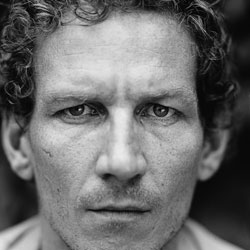are without exception irresponsible. Which
sounds alarming and is, admittedly, an aberration
(perhaps not funny) of a more valid, thinkable notion,
that dolphins, wolves, chimps, etc., flip a switch
in us, casting klieg light on the frightening solitude
engendered by the very Fifties idea — I know —
that we alone are responsible for our own
consciousness. A friend, who’d taken work as tutor
to a high-school student, leaned over the back wall
of a booth in a pub and told me: of all the thumbnail
sketches he’d done for her, from Plato to Pascal
and beyond, this Sartrean concept of taking ownership over all
that you know, feel, and do, had proved the most opaque,
the singularly most inconceivable stupidity
ever designed to befall a girl, driving her to kick some shitty
desk chair in frustrated disbelief. Now, Reader, make
a face that’s meant to express some woeful sense
of pity and surprise, while feeling a cold sickness underneath.
That was my face. I was mumbling things so far from the truth
of what I felt, I could have been a clergy entering the manse,
touching tops of heads, asking how days went, seeking food,
while wishing one or the other end of this circus dead.
The sight of a pint glass didn’t cause me to vomit. I didn’t
reel, sweating and murderous, out into the street; but my mood
stiffened, grew intractable, opaque; I felt blue flashes inside
that were flares of all the moments I’d sought causality,
a why for each failing of character, somewhere outside
of myself, amounting to a web of reflexive sophistry
that reached back into the years of my life like illness
discovered late, or how rot sets into wood compromising
the strength of a structure by softening its centre. Rising
from my seat, I went and faced a woman whose caress
had eased my passage through some months I couldn’t pass
through on my own, she’d been more than kind, I’d
found I couldn’t love her at the time, and fled.
So I faced her, and apologized as best I could, given the mass
of people in the pub. ‘This is a poem,’ she said, ‘and that’s not
good enough. Around here, we don’t let art, no matter
how acutely felt, stand in for what’s necessary, true, and right.
Next time you face me, maybe leave you here. End quote.’
Notes on the Poem
By the end of Ken Babstock's poem "The Minds of the Higher Animals", do you feel like you've indeed been invited into the mind of a higher animal ... or repelled, pushed away or possibly hoodwinked? Perhaps you're even left wondering what a higher mind is exactly. In fact, we're still wondering this since we first looked at this poem, so we've decided to visit it again. How the title of the poem segues so smoothly into the poem's first thought draws you (directly addressed as "Reader" as the monologue continues) right in to the narrator's ruminations. Even the abrupt and somewhat unexpected conclusion of that first remark is not without its charms. Will we be dealing here with someone who is disarmingly rueful, self deprecating but not afraid to offer definite opinions? Features and patterns of speech - particularly parenthetical interjections (ha ha) and even a dash of profanity - make the poem seem more direct and intimate. While a little long-winded, this narrator seems to be dealing honestly with the Reader. But then again, when you're direct to "make a face that’s meant to express some woeful sense of pity and surprise, while feeling a cold sickness underneath. That was my face." Is the narrator coaching the Reader to understand how his duplicitous behaviour feels? Does that make the narrator honestly dishonest? Is he being candid when he admits that "all the moments I’d sought causality, a why for each failing of character, somewhere outside of myself" only to realize that "a web of reflexive sophistry" had him denying that the "rot" originated from within? Do we cut the narrator some slack then? Or have we been subject to the manipulations of a truly higher, but not necessarily kinder, mind? Maybe the spurned lover has the best response: "This is a poem ... and that's not good enough."
